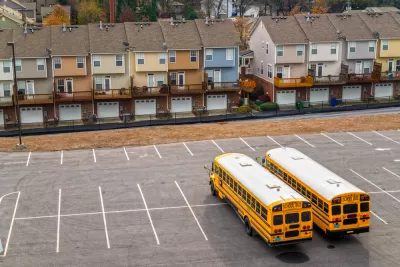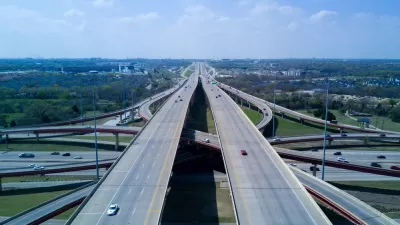Richard Florida cites new research to argue that car culture and car oriented communities are the main culprits in the unhealthy lifestyles of U.S. school children.

"Long commutes to school have negative impacts on children’s well-being, especially on sleep and exercise," writes Richard Florida, broadcasting news about a new study by researchers at Cal Poly, Rutgers University, and UCLA, published by the Journal of Planning Education and Research.
The study "takes a detailed look at how lengthy commutes affect the time kids devote to other daily activities," by analyzing "more than 2,700 high-school students’ responses from the American Time Use Survey (ATUS) conducted by the Bureau of Labor Statistics, spanning from 2003 to 2015."
There is good news to be found in the study's findings, according to Florida. The average commute was short (a8 minutes), and the most common commute was even shorter (five minutes and 10 minutes).
There is also bad news. There are a small number of students who commute more than an hour, which take a "substantial toll" on the exercise and sleep on those students. "Each additional minute of commuting is associated with an even greater 1.3-minute reduction in sleep," explains Florida. "To put that in perspective, if one student had a 10-minute commute, and a second had a 30- minute commute, the second student would get an average of 26 minutes less sleep."
Longer commutes take an even larger toll on exercise, as explained in the source article.
Florida's big point, however, is about how sprawling land use patterns force long commutes on many students, and given a shortage of realistic solutions to that problem in the near term, schools will have to take specific, effective action in shortening commute times for students.
FULL STORY: Long School Commutes Are Terrible for Kids

Maui's Vacation Rental Debate Turns Ugly
Verbal attacks, misinformation campaigns and fistfights plague a high-stakes debate to convert thousands of vacation rentals into long-term housing.

Planetizen Federal Action Tracker
A weekly monitor of how Trump’s orders and actions are impacting planners and planning in America.

In Urban Planning, AI Prompting Could be the New Design Thinking
Creativity has long been key to great urban design. What if we see AI as our new creative partner?

How Trump's HUD Budget Proposal Would Harm Homelessness Response
Experts say the change to the HUD budget would make it more difficult to identify people who are homeless and connect them with services, and to prevent homelessness.

The Vast Potential of the Right-of-Way
One writer argues that the space between two building faces is the most important element of the built environment.

Florida Seniors Face Rising Homelessness Risk
High housing costs are pushing more seniors, many of them on a fixed income, into homelessness.
Urban Design for Planners 1: Software Tools
This six-course series explores essential urban design concepts using open source software and equips planners with the tools they need to participate fully in the urban design process.
Planning for Universal Design
Learn the tools for implementing Universal Design in planning regulations.
Gallatin County Department of Planning & Community Development
Heyer Gruel & Associates PA
JM Goldson LLC
City of Camden Redevelopment Agency
City of Astoria
Transportation Research & Education Center (TREC) at Portland State University
Jefferson Parish Government
Camden Redevelopment Agency
City of Claremont





























